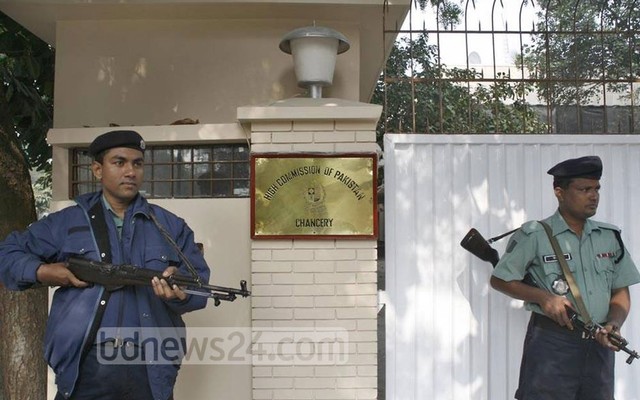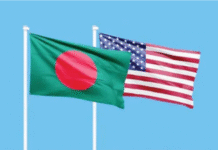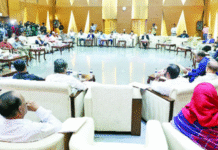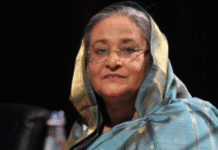The Pakistan envoy in Dhaka has been summoned and handed a “strong protest note” over her country’s remarks about the execution of the death sentence of war criminal Mir Quasem Ali.
Immediately after the senior Jamaat-e-Islami leader’s hanging on Saturday night, Islamabad reacted sharply saying it was done through a ‘flawed’ judicial process.
The foreign ministry in Dhaka said on Sunday it had summoned Acting High Commissioner Samina Mehtab and a “note verbale” has been handed over by Additional Foreign Secretary Kamrul Ahsan.
It said Dhaka has conveyed its ‘strong protest’ against the statement posted on the website of Pakistan’s foreign ministry.
Islamabad described Mir Quasem’s execution as an ‘act of suppressing the Opposition’ and ‘completely against the spirit of democracy.’
“This is an impediment to the bilateral relations,” the foreign ministry said.The government said despite Bangladesh’s repeated overtures, the “malicious campaign” by Pakistan against the trials of the crimes against humanity and genocide in Bangladesh is continuing.
Mir Quasem was a prominent leader of Jamaat-e-Islami that sided with Pakistan in Bangladesh’s Liberation War in 1971.
The International Crimes Tribunal handed down the maximum penalty to him for torturing freedom fighters to death as Chittagong’s Al-Badr commander.
He met his fate at 10:30pm on Saturday after exhausting all legal options.
Islamabad has also offered “deepest condolences” to the bereaved family members.
Pakistan had earlier issued similar statements after the execution of war criminals. Dhaka reacted to those statements by summoning the high commissioner to the foreign office.
In the latest statement posted on the foreign ministry’s website, Islamabad said it was “deeply saddened” by the execution of Mir Quasem.
The foreign ministry said by repeatedly taking the side of those Bangladesh nationals who are convicted of crimes against humanity and genocide, Pakistan has once again acknowledged its “direct involvement and complicity” with the mass atrocity crimes committed during Bangladesh’s Liberation War in 1971.
“By so doing, it is also relentlessly opposing Bangladesh’s efforts to ensure justice and break the culture of impunity for the crimes committed forty five years ago.”
Islamabad once again questioned Bangladesh’s court proceedings and its fairness and transparency, and reminded the government of the 1974 tripartite agreement on Saturday night.
“The government of Bangladesh should uphold its commitment, as per the Tripartite Agreement of 1974, wherein it ‘decided not to proceed with the trials as an act of clemency’,” Islamabad said, adding that “recriminations for political gains are counterproductive”.
The foreign ministry said, in the protest note, the government strongly rejected Pakistan’s claim that these are “recriminations for political gains”.
“In fact, he was tried for specific crimes he committed during the war of liberation of Bangladesh,” it pointed out.
The International Crimes Tribunal trials took solely into consideration the charges against humanity and genocide in Bangladesh committed by Mir Quasem during 1971 and was not at all based on his political identity or affiliation.
Mir Quasem was sentenced to death for planning, instigating and executing genocide, murder, and torture among other crimes in Chittagong during the war.
The acting high commissioner was reminded that Pakistan continues to present a “misleading, limited and partial interpretation” of the underlying premise of the Tripartite Agreement which is “totally unacceptable” to Bangladesh.
The essential spirit of the Agreement was to create an environment of good neighbourliness and peaceful co-existence for ushering in long term stability and shared prosperity in the region.
The ‘clemency’ mentioned in the agreement never implied that the masterminds and perpetrators of war crimes, crimes against humanity and genocide would continue to enjoy impunity and eschew the course of justice, it added.
“The Tripartite Agreement in no way restricted Bangladesh from prosecuting its own nationals for war crimes, genocide and crimes against humanity.”
Acting High Commissioner Samina Mehtab was also reminded that Pakistan had “systematically failed in its obligation it owes to the people of Bangladesh and the international community to bring to justice, in compliance with relevant international norms and standards, those of its nationals identified and held responsible for committing mass atrocity crimes in 1971.”
“The scope of the 1974 agreement was limited to repatriation of 195 Pakistani war criminals and remaining Pakistani prisoners of war, and the return of the Bangalis stranded inside Pakistan.”
The note stated that in no way had the 1974 Agreement given clemency to the Bangladeshi war criminals, including the members of Razakar, Al-Badr and Al-Shams.
Even after the 1974 agreement until the end of 1975, a large number of Bangladeshi war criminals were in different jails of Bangladesh facing trials, and Pakistan had never expressed its concerns by relating those trials with 1974 Agreement.
Those criminals were released only after the brutal murder of the Father of the Nation Bangabandhu Sheikh Mujibur Rahman in 1975.
“Repeated misquoting of the provisions of Tripartite Agreement of 1974 and its misinterpretation is totally unacceptable,” the foreign ministry said.
The strongly-worded note referred to the wounds and trauma inflicted on Bangladesh’s national psyche by those crimes and stated that this can be healed and put behind only through ensuring justice.
By opposing the ICT-BD verdicts and the executions, Pakistan has “blatantly dishonoured” the sentiment of the people of Bangladesh and the spirit of the Liberation War, which are the basic premise of Bangladesh’s nationhood, it said.
Given the state of judiciary in Pakistan, the note said, they do not have the “moral right” even to assess the independent judiciary of another country let alone make biased, flawed and unfounded comments.
“It only reflects their disregard for the sanctity of judiciary of another country, which nonetheless does not surprise the world.”
“It is also sheer travesty that Pakistan is judging the practice of democracy and rule of law of another country, when its past record and present state of affairs including human rights situation is a fallacy to the rest of the world,” the note added.
The acting high commissioner was told to take serious note of the points raised by Bangladesh and bring those to the attention of the Pakistan authorities.
The government also expected that the Pakistan quarters or authorities would act responsibly and would refrain from continuing such uncalled-for statements.
Source: bdnews24










